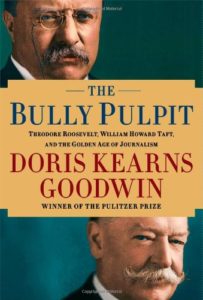 Until very recently, I didn’t think I had a real interest in history. I don’t remember my high school history classes too fondly, and most of the history books I’ve read are about the history of science.
Until very recently, I didn’t think I had a real interest in history. I don’t remember my high school history classes too fondly, and most of the history books I’ve read are about the history of science.
That really changed after I read Goodwin’s Team of Rivals on Lincoln’s life. She painted such a detailed and lively portrait of Lincoln and his world that it read more like a movie script than a textbook.
The Bully Pulpit was the same for me. The few times I’ve encountered documentaries of Theodore Roosevelt, he certainly seemed a compelling character, but this was the first book I’ve ever read about his life.
It was also the first time I ever read about journalism in the Progressive Era, and although I’d heard the term “muckrackers” before, I had no idea it originated with Theodore Roosevelt.
I also had no idea that the Philippines was once controlled by the United States or that William Howard Taft was the first governor.
Goodwin explores Roosevelt’s and Taft’s youths and the development of their deep friendship as they embarked on their political careers in Washington DC. She follows the intertwined ascent of both men into the presidency and the subsequent presidential campaign which dissolved their friendship, paining both men and the American people. Finally, she recounts the heart-warming scene of their reconciliation in the lobby of a hotel not too long before Roosevelt’s death, a reunion that drew applause from the gathered crowd and helped heal the nation.
Only two things I found a bit wanting in the story:
(1) Goodwin doesn’t discuss in much detail what both men did legislatively during their presidencies. Instead, she focused on a handful of specific bills and executive actions, such Roosevelt’s use of the Sherman Anti-Trust Act to break up large, market-manipulating trusts, although I suppose such a discussion could easily devolve into mind-numbing details.
(2) I also wasn’t completely clear on why or when Roosevelt turned against Taft. To be sure, Goodwin describes the scandals that probably soured the relationship (e.g., the Pinchot-Ballinger Controversy). But given how close the two men were before and how loyal Roosevelt was to other friends, it wasn’t clear to me why such controversies made Roosevelt so hostile toward Taft. Goodwin never really pinpoints a time when the relationship turned. Given how central that change is to the story, it would have been nice to know more about it. Since Roosevelt seemed convinced of his own indispensability to the Progressive movement, maybe he would have been dissatisfied with anyone else as president, no matter what he did.
But, on balance, this book is really a fascinating read, even to a non-history-buff.
